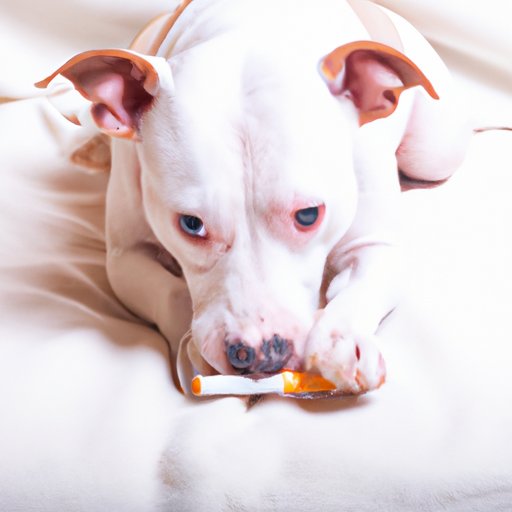
Introduction
As pet owners, we’ve all been there: our furry friend needs medication, but they don’t want to take it. Whether it’s because the medicine tastes bad or the dog is just feeling uncooperative, giving a dog liquid medication can be a real challenge. However, it’s important to get it right – medication is often necessary to help our dogs recover from illness or injury and stay healthy. This guide will provide you with a step-by-step guide on how to give a dog liquid medicine, as well as some useful tips and tricks to make the process easier and less stressful for both you and your pet.
Step-by-Step Guide
Giving a dog liquid medicine requires a gentle touch and a lot of patience. Follow these steps to ensure your dog gets the medication they need:
1. Start by measuring out the correct dosage of medication using a syringe or medicine dropper. Consult with your veterinarian or the medication packaging to determine the proper amount to give your dog.
2. Hold your dog still, either by sitting them on your lap or by having someone else hold them. Place one hand on their jaw to hold their mouth open, and use the other hand to administer the medication. If you’re using a syringe, aim for the back of the dog’s mouth so they’re more likely to swallow the medication. If you’re using a dropper, aim for the side of their mouth and let the medication slowly drip in.
3. Once you’ve given the medication, keep your dog’s mouth closed and their head tilted upwards for a few seconds to encourage them to swallow.
4. Follow up with a small treat to help mask any unpleasant taste and reinforce positive behavior.
Equipment and Materials
Having the right equipment and materials on hand can make giving your dog liquid medication much easier. Here are some essential items to have:
– Syringes or medicine droppers for measuring and administering medication
– A plastic feeding tube (if recommended by your veterinarian)
– Special treats designed to mask the taste of medication
– A designated area for administering medication, such as a towel-lined table or a soft mat on the floor
Tricks and Techniques
Sometimes, even with the best intentions, giving a dog liquid medication can be a difficult process. Here are some creative tricks and techniques that might make it easier:
– Coat the medicine dropper or syringe tip with peanut butter or another tasty spread that your dog loves. This can help entice them to take the medication more willingly.
– Try using a spoon handle coated with peanut butter to gently pry open your dog’s mouth, making it easier to administer the medication.
– If your dog is particularly resistant to taking medication, you could try mixing it with a small amount of wet food to make it more palatable.
Stay Calm
It’s important to stay calm and patient when trying to give a dog liquid medicine. Dogs can sense when their owners are stressed or anxious, which can make them more difficult to handle. If your dog gets agitated, take a break and come back to it later. You could also try distracting them with a favorite toy or treat.
Remember, it’s normal to encounter some difficulties when giving your dog liquid medication. With practice and patience, most dogs can learn to take their medicine without issue.
Follow-Up Care
After your dog has taken their liquid medication, it’s important to follow up with some additional care:
– Provide plenty of fresh water to help your dog stay hydrated.
– Avoid feeding your dog for at least 30 minutes after administering medication to help ensure they don’t regurgitate the medication.
– Take your dog for a walk or engage them in some other form of exercise to help take their mind off the medication and keep them active and healthy.
– Always follow your veterinarian’s instructions for post-medication care, including when to administer subsequent doses.
Conclusion
Giving a dog liquid medication can be challenging, but with the right tools, techniques, and attitude, it’s a task that can be accomplished with ease. Remember to stay patient and calm, and always follow the instructions provided by your veterinarian or the medication packaging. By doing so, you can help ensure that your dog gets the medication they need to feel better and stay healthy.





